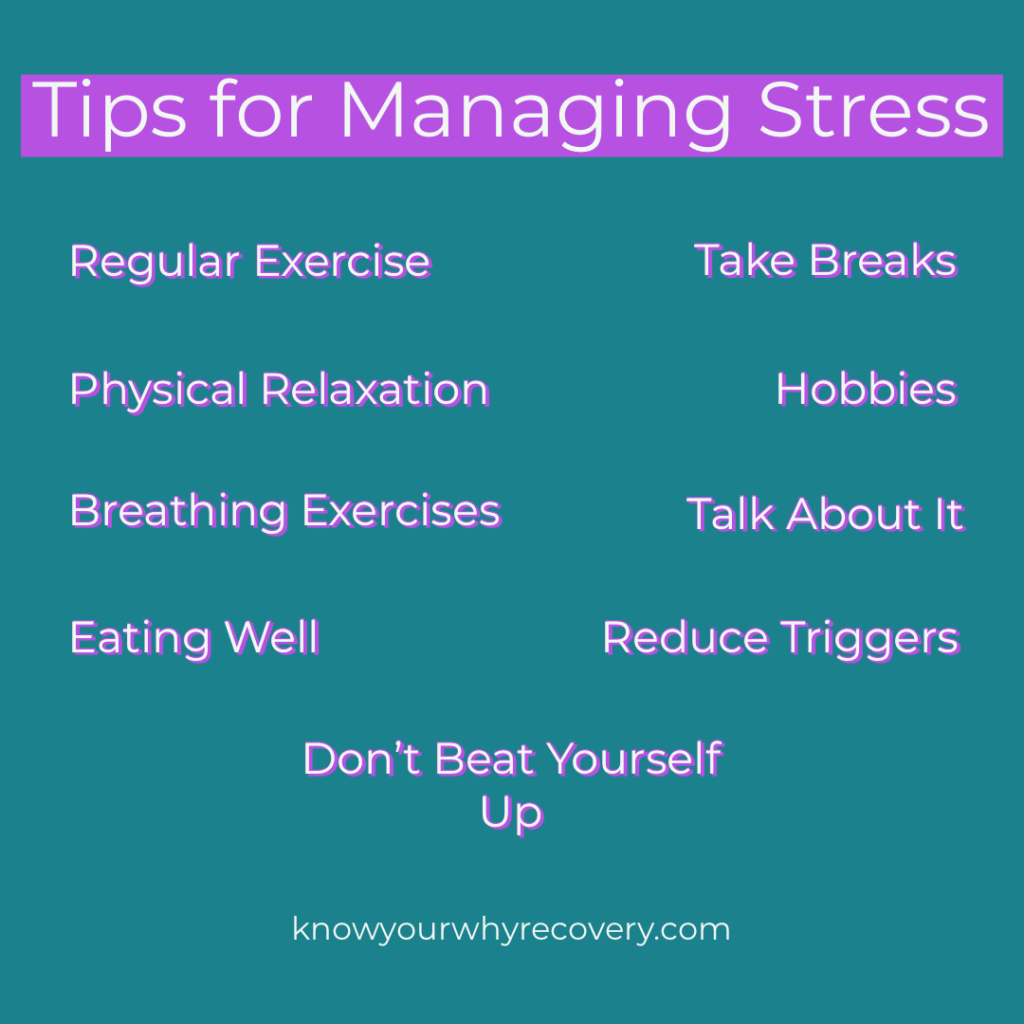Everyone experiences stress. Stress can come from positive experiences and changes, as well as, negative experiences or changes. The existence of stress is not necessarily problematic, in fact, stress has many functions including helping you to avoid real threats, motivation, to help you focus, and improve performance. Experiencing high levels of stress over long periods of time is what is dangerous to our mental and physical well being. You can read more about the purpose and effects of stress from WebMD here.
Keeping that in mind, it makes sense for us to manage our stress levels to ensure our physical and mental well being. The following are some tips you can utilize to help manage stress:
Exercise Regularly-Exercising assists in managing stress in multiple ways but it must be done consistently. Exercise helps improve our mood, improves energy levels, boosts our confidence, and relaxes not only our body but also our mind. Regular exercise can also help keep our mind neuro plastic, or flexible and primed for growth. Before engaging in an exercise program, please consult your doctor to discuss what is safe and appropriate.
Physical Relaxation-Stress causes tension. To relieve tension we can focus on the physical relaxation for the muscles. This can be done with professional assistance, such as getting a massage, but you can also stretch, utilIze self massage techniques, do a progressive muscle relaxation exercise, or make use of items such as warm baths or heating pads to soothe tension. Don’t forget the importance of good sleep as well.
Breathing Exercises-Breathing exercises can help manage not only physical tension but the mental experience of stress. Some can be done in a high stress moment, others can be done regularly to help manage stress. We can also include meditation in this category. There are a number of free applications that can be downloaded to help guide you in breathing exercises or a meditation practice. For an example of an easy to use breathing exercise check out our previous blog on box/square breathing here.
Eating Well-Eating a healthy, well balanced, nutrient rich diet helps keep our bodies and our minds functioning optimally and primed to stave off some of the effects of stress. This also includes eating regularly and not skipping meals. Hunger can lead to changes in mood and changes in energy. Theres a reason society has embraced the term hangry (hungry and angry)! While not specific to diet and healthy eating, there is some information about nutrients that may be beneficial for mind and body in our previous blog here.
Take Breaks-We all need a break once in a while. Be sure that while working or even engaged in any stress inducing task you are taking regular breaks or at least breaks when you start feeling a shift in mood or productivity. Your break does not have to be long but just enough to pause the stress momentarily and allow you to gather your mind and breath. Equally important are longer breaks such as setting aside time daily for relaxation or scheduled time off like vacations.
Hobbies-Make ample time to engage in the things you enjoy. If you don’t have any hobbies try something new, go out and find one! Most hobbies take just a few minutes to engage in and be done daily. Some examples are reading, puzzles, coloring, writing, crafts, or listening to music.
Talk About It-If you are dealing with a problem, troublesome emotions, or high levels of stress, talk about it. While you can do this via a professional like a therapist or counselor, sometimes a friend or family member who is a good listener is plenty. Self help support groups can also be a place where you can discuss stress in your life. Don’t discount the power of positive self talk. For more ideas on professional help and self help support groups visit our resource page here
Reduce Triggers-Triggers are the things that increase our stress or activate our physical and mental reactions. If we can eliminate our triggers than we will have lower levels of stress. However, we can never eliminate all triggers which is why we suggest reducing them. The first step is identifying what your stress triggers are. If you are having a hard time, track your stress and what occurred that day. You may begin to see patterns. Once you identify the sources of your stress you can begin to develop a plan to address them.
Don’t Beat Yourself Up-Perfection is not possible. As humans, we all make mistakes sometime. Often our biggest critic is ourselves. Recognize that mistakes happen, and turn them into learning opportunities. Also, keep in mind sometimes things just don’t go our way, even if it appears we are doing everything we think is positive and necessary. If the source of stress is something that is not in our control, we do a disservice to ourselves by worrying too much about it! Concentrate efforts on what we can control and what we can actively change to focus our energies appropriately and reduce stress.
Chris Dorian, founder of Know Your Why Recovery

One reply on “Tips for Managing Stress”
[…] worry that facing your emotions head-on in meditation could be re-traumatizing. You may want to work on mindfulness techniques in therapy, where you can process your emotions with the support of a professional. Journaling, meditation, […]